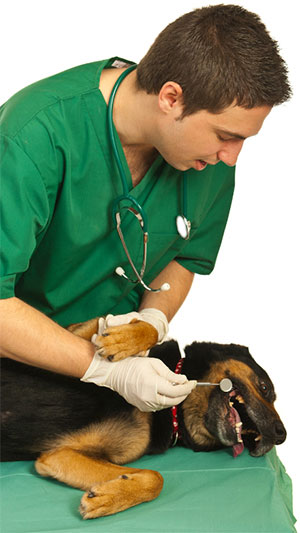Anesthesia-Free Teeth Cleaning
When it comes to pet dental work, there are three approaches:
- Veterinary dentists
These dentists are trained specifically to do dental work, and normally do complicated and specialty dental procedures. - Traditional teeth cleaning at a veterinarian's office
Contrary to what many pet owners think, the teeth cleaning is usually completed by a veterinary technician, not by the vet themselves. Their dental skill and training vary greatly. The benefit of cleaning teeth at a vet's office is that antibiotics, emergency care, and x-rays are available. But a disadvantage is that anesthesia is used which can be dangerous (especially if a dog's health is compromised). - Anesthesia-free teeth cleaning
Anesthesia-free dental practitioners range in skill from very little training, to those who were dental hygienists for people, or vet techs who have significant experiencing cleaning teeth in a veterinary practice and have chosen a more natural approach. Some have advanced skills when it comes to animal handling, and this is very important when it comes to anesthesia-free teeth cleaning.
Many Naturopathic vets and vets who offer a more integrated approach of both natural and traditional healthcare offer this service, or can recommend a qualified anesthesia-free professional.
Benefits of Anesthesia-Free Teeth Cleaning

Qualified anesthesia-free dental technicians offer a valuable service to the pet health community. Many perform this service using newer technology and instruments necessary to complete a safe and effective cleaning.(1) They have finely honed animal handling skills to handle some of the most difficult pets, and have the patience and firmness to effectively do the job.
Benefits include:
- No anesthesia is required to clean your pet's teeth. Just as with humans, anesthesia carries health risks.
- It is a less invasive procedure for high-risk pets (e.g. those with heart disease, kidney or liver disease, have a history of seizures, or those who have had a recent injury or infection).
- No drugs are used, and therefore there are no drug side effects.
- It is less painful.
Find an Anesthesia-Free Professional Near You
We recommend only a dental professional perform this procedure, preferably in a veterinary office or under the supervision of a vet. Taking your pet to a groomer or pet supply store, or other such place for a teeth cleaning that does not have the appropriate training means they are not qualified to evaluate whether your pet is a poor candidate. They also cannot perform a health exam to determine health conditions your pet may have that make them an inappropriate candidate for an anesthesia-free teeth cleaning.
If there are signs of an active infection in the gum area, antibiotics or specific care may be required to get the infection under control by a qualified professional before teeth cleaning is done. In short, you could be putting your pet at risk by not ensuring the person performing the dental work is qualified.
To locate an anesthesia-free provider near you, check out local veterinarians with a naturopathic approach to dental care. There are also national organizations who offer this service under the supervision of licensed veterinarians, including:
- Pet Dental Services
- Animal Dental Care
- The Well Animal Institute (Denver & surrounding areas)
Anesthesia-Free Teeth Cleaning - FAQs
- Can teeth really be cleaned as well as when cleaned under anesthesia?
Your pet can be given a very thorough cleaning without anesthesia. Just as it is not a requirement for us to have anesthesia to have our teeth cleaned at the dentist, in many cases neither do our pets. A good practitioner should insist you see a vet first if your dog has dental disease, or other health concerns that may make the anesthesia-free method not the best option for your pet.
Similar to humans, by having anesthesia-free teeth cleaning, build-up can be removed before it progresses to dental disease. But remember... prevention is the best course of action when it comes to dental care, and there are several important things you can do to drastically reduce the tartar build-up on your pet's teeth.
- Aren't pets too difficult to handle for the procedure?
Some veterinarians who do not advocate anesthesia-free teeth cleaning (and many do!) feel that teeth cannot be as effectively cleaned without the use of anesthesia because pets may be too difficult to handle, or need to be pinned down, fighting all the way. In the vast majority of pets, it is the exact opposite, and they instinctively remain calm. However, there are some who are either too aggressive, or simply too high-strung and are not good candidates for no anesthesia.

When checking out the procedure for my pup, I watched several procedures done (watching from behind a window was more than welcomed) and found it strange just how calm pets were, regardless of the breed. I was positive that Luna, my rambunctious Alaskan Malamute, would be the exception and would never, EVER allow such work to be done on her mouth! After spending a few minutes with her, the vet tech simply smiled at my protestation.
To my utter amazement, Luna was taken in and for the entire procedure, barely moved. The gentle, yet firm handling by the experienced dental tech set my mind completely at ease. Not only that, but all the brown staining had completely disappeared from her teeth after the cleaning was complete.
As a side note, I have witnessed some very difficult children at my dentist's office, but hark, did I hear the dentist calling for anesthesia to clean their teeth? Of course not! The dentist recommended a pediatric dentist whose specialty was "handling difficult and nervous children." A vet may have the skillset to clean teeth, but not all vets can claim to have the patience and animal handling skills to handle a pet for anesthesia-free teeth cleaning and should not condemn the practice because of this. Pet handling is an acquired skill itself, and the beside manner of a vet can be as good (or as bad) as any doctor's bedside manner. - How often should my pet's teeth be professionally cleaned?
It depends on how well you take care of their teeth. Pets are no different from humans in this regard. When it comes to dental care, prevention is the best treatment. In general, when teeth begin to noticeably discolor, it is time to consider a cleaning.
By understanding simple steps you can take to reduce dental problems in your pet, you can greatly minimize the number of times a professional teeth cleaning is needed. See how diet, dental chews/bones, and simple at-home care can make a big difference.
Is My Dog A Good Candidate?
Many pets are great candidates for anesthesia-free teeth cleaning, even difficult ones. But for others, a more traditional approach may be the best approach. Your pet's age, health, the condition of their teeth, and their temperament are important considerations.
Pets that are normally disqualified from anesthesia-free dental cleaning include:
- Dogs with serious dental issues, or advanced dental disease
- Dogs with loose teeth
- Dogs who are very aggressive or high-strung
If your pet has been given a clean bill of health, and your vet does not offer anesthesia-free dental cleanings, consider exploring a veterinary practice who does if you are interested in this option. Especially consider anesthesia-free teeth cleaning if your pet has a chronic disease, to limit the need for anesthesia as much as possible.
RELATED ARTICLES
- Healthy & balanced pet diet
- Why pets are getting sicker
- Treating common pet injuries
- Pet first aid kit
- Pet-proofing your home
- Preparing for a new pet!
- Pet food recalls
- Fleas, ticks, & mosquitoes
- Natural dog grooming
- Pet vaccinations
- Declawing



